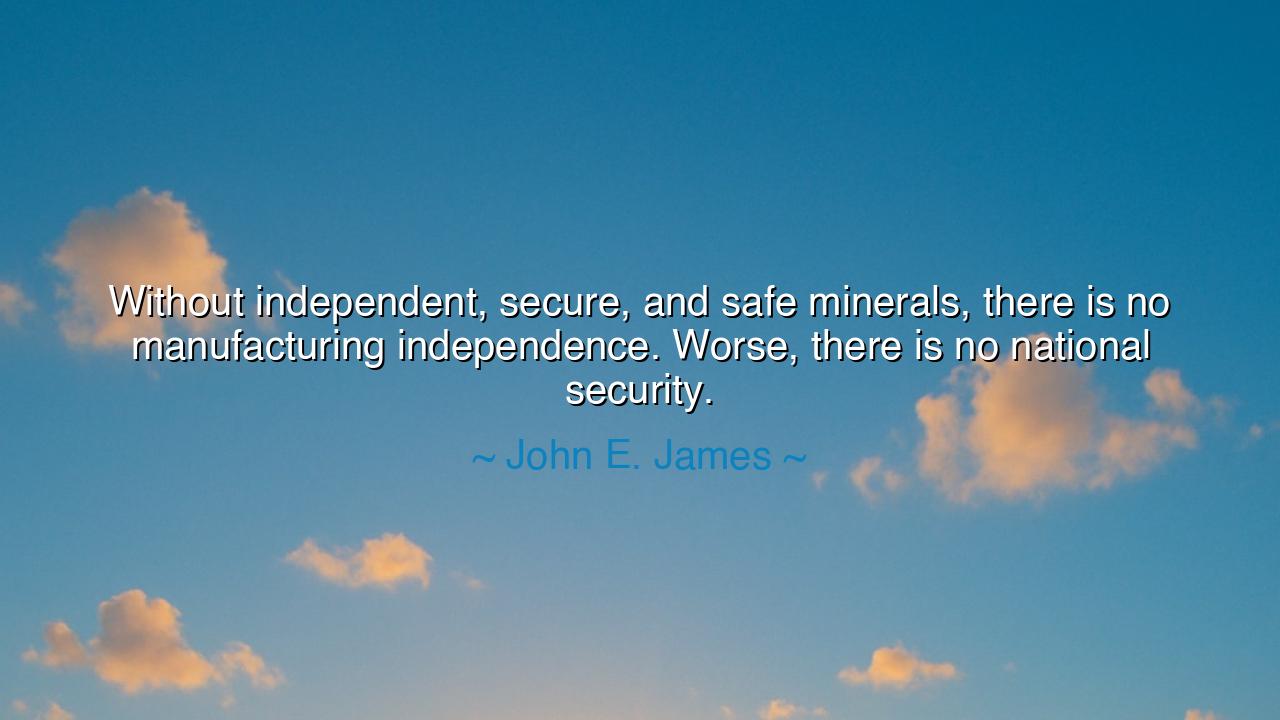
Without independent, secure, and safe minerals, there is no
Without independent, secure, and safe minerals, there is no manufacturing independence. Worse, there is no national security.






The words of John E. James strike like a hammer upon the forge of civilization. When he declared, “Without independent, secure, and safe minerals, there is no manufacturing independence. Worse, there is no national security,” he was not merely speaking of trade or technology—he was invoking the eternal law that strength begins at the source. His words remind us that power is not built upon speeches or symbols, but upon the raw materials of the earth—the stone, the steel, the energy, and the spirit that a nation must claim as its own. In his voice echoes an ancient warning: a nation that cannot sustain itself from within will one day kneel before those who can.
To understand his meaning, one must look deep into the relationship between resources and sovereignty. From the dawn of civilization, the fate of nations has turned not upon the splendor of their temples or the beauty of their art, but upon their mastery of the elements beneath their feet. The minerals of the earth are the lifeblood of every empire—iron for swords, copper for circuits, lithium for batteries, rare earths for the unseen engines of the modern world. When a nation loses control over these, it loses control over its future. John E. James, a soldier, businessman, and public servant, speaks as one who understands that the independence of a people is forged not in words, but in mines, mills, and courage.
Consider the story of the Second World War, when the world was torn between tyranny and freedom. The United States, rich in steel, oil, aluminum, and human will, became the arsenal of democracy. The ability to produce ships, planes, and weapons faster than the enemy could destroy them was the difference between victory and subjugation. That was not luck—it was resource independence. Contrast this with Japan, whose ambitions for empire were driven by its desperate lack of raw materials. It sought oil in Indonesia, iron in China, and coal in Manchuria—and in reaching for them, it ignited the fires of war. Thus, from the mines of the earth sprang the destinies of nations.
In the modern age, the battlefields have changed, but the truth remains. The wars of tomorrow are not fought only with weapons, but with supply chains, data, and minerals. The batteries that power our vehicles, the chips that guide our missiles, the phones that connect our lives—all depend on elements drawn from the ground. If these resources are held hostage by foreign powers, a nation’s security, economy, and freedom become threads in another’s hand. To rely upon others for the raw pulse of industry is to surrender silently, without the sound of battle. And so James speaks to us as a watchman at the gate, warning that dependence is the quiet path to defeat.
In the style of the ancients, let this truth be carved in stone: independence begins in the soil. The earth is not a mere possession, but a covenant. Those who care for it wisely, who draw from it responsibly, who guard its bounty with foresight—these are the stewards of their nation’s destiny. But those who plunder it for profit, or who sell it for convenience, betray not only their land but their children’s inheritance. A tree cannot grow strong if its roots lie in another man’s garden. Likewise, a nation cannot stand tall if its foundations rest in foreign hands.
Yet this lesson is not for nations alone—it is for every soul. Each person must learn the principle of self-reliance. Just as a nation must secure its resources, so too must an individual secure their own values, knowledge, and strength. Dependence, whether economic or spiritual, weakens the will. True security comes from what we cultivate ourselves—our skills, our integrity, our connection to the land that sustains us. The miner’s pick, the farmer’s plow, the engineer’s forge—all are acts of independence, all are defenses of freedom.
And so, the wisdom of John E. James calls to us across the noise of modern comfort: build, dig, and defend with purpose. Do not trade sovereignty for convenience, nor safety for ease. Cherish the earth’s resources, not as commodities to be exploited, but as treasures to be guarded. For when the mines run dry, when the foreign ships no longer come, when the world grows uncertain, only those who stand upon their own ground will endure.
Let the generations remember this lesson: the strength of a nation begins not in its words, but in its work—in the steady hands that mine its ore, the minds that shape its steel, and the hearts that refuse to surrender their independence. For when the earth beneath one’s feet is secure, the nation above it stands unshaken.






AAdministratorAdministrator
Welcome, honored guests. Please leave a comment, we will respond soon